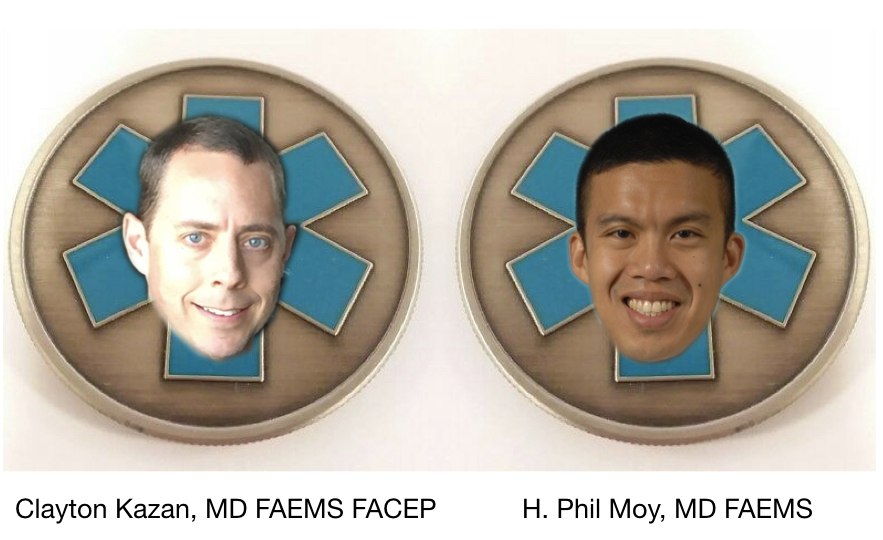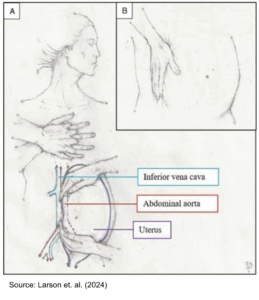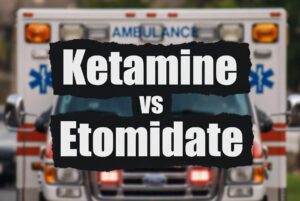Should paramedicine require a minimum degree? In this post, two EMS physicians, Clayton Kazan (Medical Director for LA County Fire Department) and Hawnwan P. Moy (Medical Director for ARCH Air Methods in Missouri) , debate the Pros and Cons.

CON: Raise the Roof, Not the Floor.
by Clayton Kazan MD FACEP FAEMS
Far be it from me to knock the benefits of higher education. It was always one of my narcissistic goals to achieve more letters after my name than in it, and, with the addition of FAEMS this year, I have finally achieved it. I think that the “associations,” as they describe themselves in the PEC published joint statement (NEMSMA, NAEMSE, IAFCCP), are going about this the wrong way, and the detrimental effects on paramedic programs, particularly fire-based programs, will be severe. [1] I have been involved in training EMTs and paramedics since 1995 (again with the narcissism), and I would be a huge supporter of this concept if I believed that this was the gap between poor and good (or good and great) prehospital clinicians…that, if only they had fulfilled the general education courses needed to finish their degree, they would be given the tools they need to build strong clinical skill. By the same argument, I am a better physician today because of the undergraduate coursework that I completed at my alma mater (UCLA). So, linguistics (my textbook was a freaking dictionary), psychology (rats given dopamine will forego food and sex to get it), art history (pyramids at Giza = cool) are really part of the fabric that makes me an amazing clinician (yup) today? Even my science courses had very limited applicability…unless the human body has a xylem and phloem, or I am ever asked to synthesize a perfume that smells like bananas. If you think that these types of courses would not be required of our paramedics, then I invite you to review the A.S. requirements of a junior college. [2] I took the EMT course as a sophomore specifically because my coursework had NO relevance to my chosen field, and the rest is history.
The issue we have as we strive to develop an EMS profession is not the prerequisites that our paramedics bring as they start their careers, it’s that it is a dead end. Requiring an A.S. degree does not change that. The position statement states that 60% of paramedic programs already offer an Associate’s or Bachelor’s degree program is misleading because, using their source, only 1.6% currently offer Bachelor’s. [3] If you want to take those Associate’s Degrees and use them toward a Bachelor’s, how many of the universities are giving course credits for the paramedic program and not requiring the students to start from scratch with introductory biology, physiology, etc.? In California (because the west coast is the best coast), the answer is zero. Thus, the Associate’s is a dead end, and that is part of the reason why many students do not continue their education to finish their degree.
What is missing in our prehospital clinicians is the opportunity and encouragement to be lifelong learners, to stay in EMS, and to advance past paramedic. Build the degree programs so their paramedic certificate is worth something to them from a career advancement perspective. Requiring an A.S. of everybody may raise the floor, but it definitely does not raise the ceiling. Build bridges within the house of medicine to use that credit towards a nursing, PA, or, dare I say it (I dare, I dare), a medical degree…so our providers don’t feel chained to their ambulance or squad for the duration of their career. Rather than knocking our current programs back to EMT-I (BTW not recognized in Cali), build an advanced paramedic level with an expanded scope of practice, as we have for our flight programs. What our profession needs is a carrot, not a stick.
Lastly, I want to comment (rant) on a statement made near the end of the article… “From an economic standpoint it is almost certain that degree requirements will restrict the supply of available paramedics to some extent.” For fire-based EMS systems, this represents a disastrous, unfunded mandate that will severely affect the supply of available paramedics. They are right that it creates an upward surge in salary, but their argument that this money will come from third party payers and local governments is ludicrous. Requiring paramedics to have degrees will not squeeze one penny out of health insurers, local government budgets are nightmarish without this. To me, “the associations” have not clearly thought through what stream actually fills this imaginary pool of money they think will pay for this. As huge constituents of the schools and employers of the graduates, it is essential that fire-based EMS provider stakeholders have a voice in the future direction of paramedic programs, and I urge our membership to read their reply.4
References
1. Sean M. Caffrey, Leaugeay C. Barnes & David J. Olvera (2018) Joint Position Statement on Degree Requirements for Paramedics, Prehospital Emergency Care, DOI: 10.1080/10903127.2018.1519006
2. Illinois Central College. www.icc.edu. https://icc.edu/academics/catalog/associate-in-science/associate-in-science-degree-requirements/. Accessed January 5, 2019.
3. Programs CoAEMSP. Find a Program 2018; Selected Paramedic, Accredited, All States and Provinces with boxes checked for associates, bachelors and masters compared to all chek boxes (inclusive of certificate and diploma). 2019. Available at: https://www.caahep.org/Students/Find-a-Program.aspx. Accessed January 5, 2019.
4. Fire Service EMS. www.fireserviceems.com. http://fireserviceems.com/joint-position-statement-opposition-to-proposed-degree-requirements-for-accredited-paramedic-programs/. Accessed January 7, 2019.
PRO: A Good Build Starts with a Strong Foundation
by Hawnwan P. Moy, MD FAEMS
I’ll start by stating that Dr. Kazan and I are friends. Like all traditional friendships, we embrace our similarities and poke fun at our disagreements. I dare not break tradition. While Dr. Kazan MD FACEP FAEMS #SpoiledinCali (sorry @PEMEMS) believes that requiring further education for paramedics is all for naught, I believe this is a crucial step in creating a better trained, more prepared and well-rounded paramedic.
Critical thinking is essential to practicing excellent paramedicine. What defines a great paramedic is NOT what procedures they can do, but how they think. No offense to any 12-year-old, but we can teach any 12 year old how to intubate. But to teach a 12-year-old when to intubate, when to anticipate a bad airway, or whether they should intubate requires critical thinking. “Critical thinking is that mode of thinking — about any subject, content, or problem — in which the thinker improves the quality of his or her thinking by skillfully analyzing, assessing, and reconstructing it.” [4] Paramedic educators have the responsibility to teach the fundamentals of paramedicine. Yet they rarely have enough time to build a foundation for critical analysis. This is where creating education requirements for paramedics is paramount.
In order to engender critical thinking, a solid foundation must be established beyond high school education. A foundation of critical thinking has to be broad to expose the mind to different ways of thought. So while I agree that linguistics (I can’t believe you took Latin @Clayton_Kazan), psychology (Maslow’s Hierarchy of needs is important, but listen to Ginger Locke’s Hierarchy of needs here!) and art history (pyramids, schmyramids…The Great Wall is so much cooler) have a low correlation to actual clinical medicine, the underlying benefits of challenging the mind to think differently, to understand the world from different viewpoints, to learn from history’s lessons, to understand different ways to achieve the same goal, provides an invaluable foundation to critical thinking.
Let me utilize someone from Dr. Kazan’s beloved California as an example, Steve Jobs. Yes, Steve Jobs didn’t finish college. However, he did enroll in at least a year of college where he had to take general basic courses that had nothing to do with computers. One such course was calligraphy (see Steve Job’s Standford Graduation Speech). In the 70’s, the world of computers only had Atari-like block font. Yet it took someone like Jobs who had experience in calligraphy, an appreciation for design, and the critical thinking to apply calligraphy to computers to revolutionize the world of technology. Just look at this very webpage you’re reading. All those different fonts evolved from Steve Jobs’ influence. As he said, “…you can’t connect the dots looking forward; you can only connect them looking backward. So you have to trust that the dots will somehow connect in your future. You have to trust in something your gut, destiny, life, karma, whatever.” So while I agree that taking general education courses may have little relevance to the field of medicine, they do create a foundation for critical creative thinking and may even create unique solutions.
On that note, I do not believe that an associates degree is a dead end, but a beginning of a journey. Dr. Kazan is correct in that the sources he cited, only 1.6% of programs currently offers Bachelor’s degree. Technically speaking requiring a Bachelor’s degree would provide a stronger base, but for those who face real-life challenges where time is not a luxury, a two years Associate’s degree is a good start. 30/50 states have some sort of guarantee of transferring credits to a Bachelor\’s degree.
Nonetheless, Dr. Kazan speaks some truth. Encouraging a love of learning in your paramedics and paramedic advancement are key to job satisfaction. I think it is great when paramedics gain additional medical training beyond paramedicine to become a physician assistant or physician, but not all paramedics want to leave the job – and we don’t want them to. I know plenty of paramedics who are in the field because they love what they do and don’t want jobs that take them within four walls. I agree paramedics should have a career ladder. However, that ladder should be based not only on experience but education. Just look at our fire brethren who require further education – a Bachelor’s (or Masters!) in Fire Science-for advancement in their career. You’re right Dr. Kazan, paramedics do need a carrot and our paramedics deserve to be paid more for their work. That can be justified by a required education needed to become a paramedic. Nurses did it with their profession. [3,8] Why can’t we?

To follow up on the supposed financial catastrophe that the number of paramedics will fall precipitously due to education requirements, let’s look at other states who have paramedic education requirements, Kansas and Oregon1. Those states have enacted education requirements and guess what?!?! EMS continued to march on. Yes, change is scary. We have every right to be anxious. Maybe this will initially affect the number of paramedics enrolling in our systems. Yet looking at these two states as examples, proves that a possible decrease in paramedics will not last indefinitely.
In the end, Dr. Kazan and I are two sides of the same coin. Despite our differences (one of the main ones being I’m better-looking :P), we believe in education and care deeply for the future of paramedicine and paramedics. He works in a successful EMS system and is one of the grittiest, dedicated EMS medical directors I know. I do not fault his comments. In fact, I encourage it. I thank him for it. It creates thoughtful conversation, a lively debate, and dare I say it a valuable viewpoint that forces you, the reader, to critically think about your own thoughts on education requirements for paramedics. See what I did there? So, Dr. Kazan, I raise my glass to you and I just have one thing to say to your impending retorts. I know you are, but what am I?
To hear a lively debate about this very issue, check out our PEC podcast discussion here!
References
-
Caffrey, Sean M., et al. “Joint Position Statement on Degree Requirements for Paramedics.” Prehospital Emergency Care, vol. 23, no. 3, 2018, pp. 434–437., doi:10.1080/10903127.2018.1519006.
-
JoshuaG. “Steve Jobs Stanford Commencement Speech 2005.” YouTube, YouTube, 6 Mar. 2006, www.youtube.com/watch?v=D1R-jKKp3NA.
-
Kutney-Lee, Ann, et al. “An Increase In The Number Of Nurses With Baccalaureate Degrees Is Linked To Lower Rates Of Postsurgery Mortality.” Health Affairs, vol. 32, no. 3, 2013, pp. 579–586., doi:10.1377/hlthaff.2012.0504.
-
“Our Concept and Definition of Critical Thinking.” Our Conception of Critical Thinking, www.criticalthinking.org/pages/our-conception-of-critical-thinking/411.
-
“PEC Podcast.” Prehospital Emergency Care Podcast – the NAEMSP Podcast, pecpodcast.libsyn.com/pec-podcast-6.
-
“Prehospital Emergency Care Podcast Ep. 58.” Prehospital Emergency Care Podcast – the NAEMSP Podcast, pecpodcast.libsyn.com/prehospital-emergency-care-podcast-31.
-
“Resource Title:50-State Comparison: Transfer and Articulation Policies.” Education Commission of the States, www.ecs.org/transfer-and-articulation-policies-db/.
-
Smith, Linda S. “Said Another Way: Is Nursing an Academic Discipline?” Nursing Forum, vol. 35, no. 1, 2000, pp. 25–29., doi:10.1111/j.1744-6198.2000.tb01175.x.



